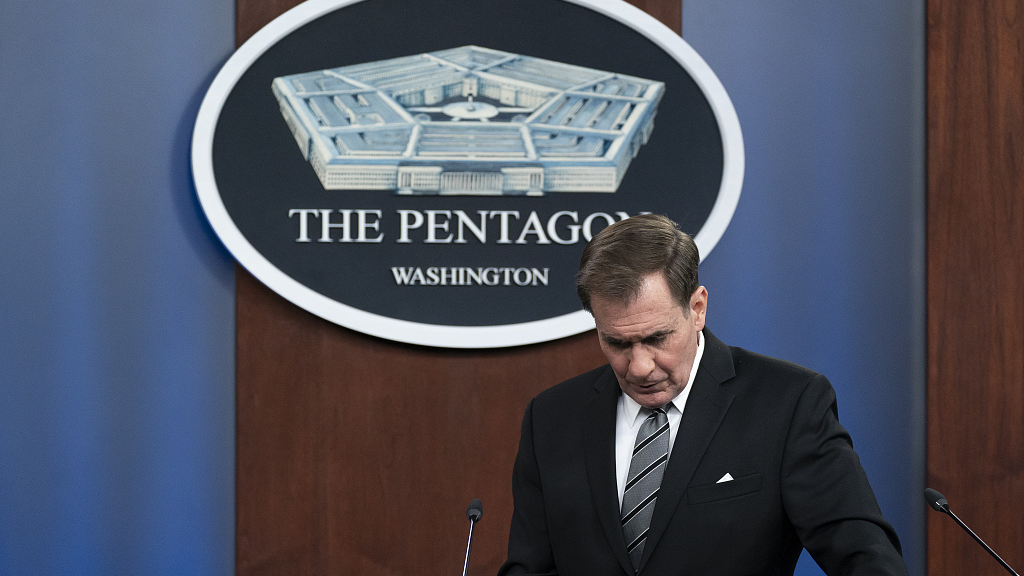
Pentagon spokesman John Kirby listens to a question from a reporter on the phone during a media briefing at the Pentagon, Tuesday, May 17, 2022, in Washington.
Pentagon spokesman John Kirby listens to a question from a reporter on the phone during a media briefing at the Pentagon, Tuesday, May 17, 2022, in Washington.
Editor's note: Andrew Korybko is a Moscow-based American political analyst. The article reflects the author's opinions and not necessarily those of CGTN.
Classified documents from the Pentagon were recently shared on social media after first allegedly being posted on various online forums, before attracting U.S. officials and mainstream media's attention. While their veracity hasn't been confirmed, nor the specific details they contain, Washington is taking the matter very seriously and has reportedly launched an investigation. This reaction adds credence to speculation that some sort of leak did indeed occur.
Should that be the case, then this scandal will end up being very embarrassing for the U.S. The documents prove that Washington was spying on Russia, which was to be expected, but also on American allies like Israel, the Republic of Korea, and Ukraine. All three of them are that country's close partners, whose ties are officially supposed to be characterized by mutual trust. Now, however, it looks like the U.S. doesn't truly trust them all.
This observation contradicts the rhetoric from the Joe Biden administration, claiming that the world is nowadays divided between "democracies" and "dictatorships," an assertion reiterated during last month's second Summit for Democracy. If U.S. officials really believed what their representatives claim about this bifurcation of international relations into those two blocs, then they'd take their counterparts' words at face value instead of spying on them just to be sure that they're telling the truth.
This unfriendly snooping resembles the Barack Obama administration-era scandal sparked by former contractor Edward Snowden's dramatic disclosures a decade ago. Back then, it turned out that the U.S. was spying on close partners like Brazil, Germany, and Mexico, among others. They eventually patched up their problems, but there's reason to believe that America didn't learn its lesson from that embarrassing episode. Otherwise it wouldn't have continued spying on its allies.

Former intelligence contractor Edward Snowden poses for a photo during an interview in Moscow, Russia, December 2013. /CFP
Former intelligence contractor Edward Snowden poses for a photo during an interview in Moscow, Russia, December 2013. /CFP
What this goes to show is that its much-touted "rules-based order" isn't about treating countries with respect and upholding international law like its proponents claim, but about the arbitrary implementation of double standards designed to advance America's hegemonic interests. One can only imagine how wildly the U.S. would react if classified documents were to circulate around the internet purporting to prove that Russia was spying on these same countries, let alone its own allies.
The mainstream media machine would then kick into full gear, with stories explaining why the Kremlin can't be trusted, and pressuring those that it allegedly spied upon to cut their ties with Russia – or at least meaningfully distance themselves from it as a form of principled protest. The resultant scandal would likely remain in the public's consciousness for as long as possible since the U.S. wouldn't have any interest in letting it die down until it reaped tangible benefits.
Since the proverbial shoe is on the other foot, however, Washington wants to downplay what happened and do its utmost to ensure that this scandal goes away as soon as possible due to how embarrassing it is. The soft power consequences could sow the seeds of distrust between the U.S. and those countries, which is especially significant with respect to Ukraine, whose armed forces are reportedly preparing for an impending U.S.-backed counteroffensive against Russia.
On that subject, CNN reported on April 10 that Kyiv modified some of its related plans in response to the latest leak, which would serve as further circumstantial evidence that some of their contents were accurate if this is indeed true. In that event, it should also be taken for granted that Russia closely studied them as well, and perhaps accordingly changed its own plans too, which could reduce the chances that Ukraine's upcoming U.S.-backed counteroffensive succeeds.
This scandal isn't even a week old and it's already caused a lot of collateral damage to American interests, and it's expected to grow as more details are publicly revealed about these leaks. Relations with its closest partners are now complicated by these latest revelations since Israel, the Republic of Korea, and Ukraine now all know that the U.S. doesn't truly trust them. They, among others, will in turn be less likely to trust America since this scandal shows that the lesson from the Snowden leaks has not been learnt.
(If you want to contribute and have specific expertise, please contact us at opinions@cgtn.com. Follow @thouse_opinions on Twitter to discover the latest commentaries on CGTN Opinion Section.)